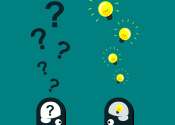Creativity refers to the phenomenon whereby a person creates something new (a product, a solution, a work of art, a novel, a joke, etc.) that has some kind of value. What counts as "new" may be in reference to the individual creator, or to the society or domain within which the novelty occurs. What counts as "valuable" is similarly defined in a variety of ways.
Scholarly interest in creativity ranges widely: Topics to which it is relevant include the relationship between creativity and general intelligence; the mental and neurological processes associated with creative activity; the relationship between personality type and creative ability; the relationship between creativity and mental health; the potential for fostering creativity through education and training, especially as augmented by technology; and the application of an individual's existing creative resources to improve the effectiveness of learning processes and of the teaching processes tailored to them.
Creativity and creative acts are therefore studied across several disciplines - psychology, cognitive science, education, philosophy (particularly philosophy of science), technology, theology, sociology, linguistics, business studies, and economics. As a result, there are a multitude of definitions and approaches.









